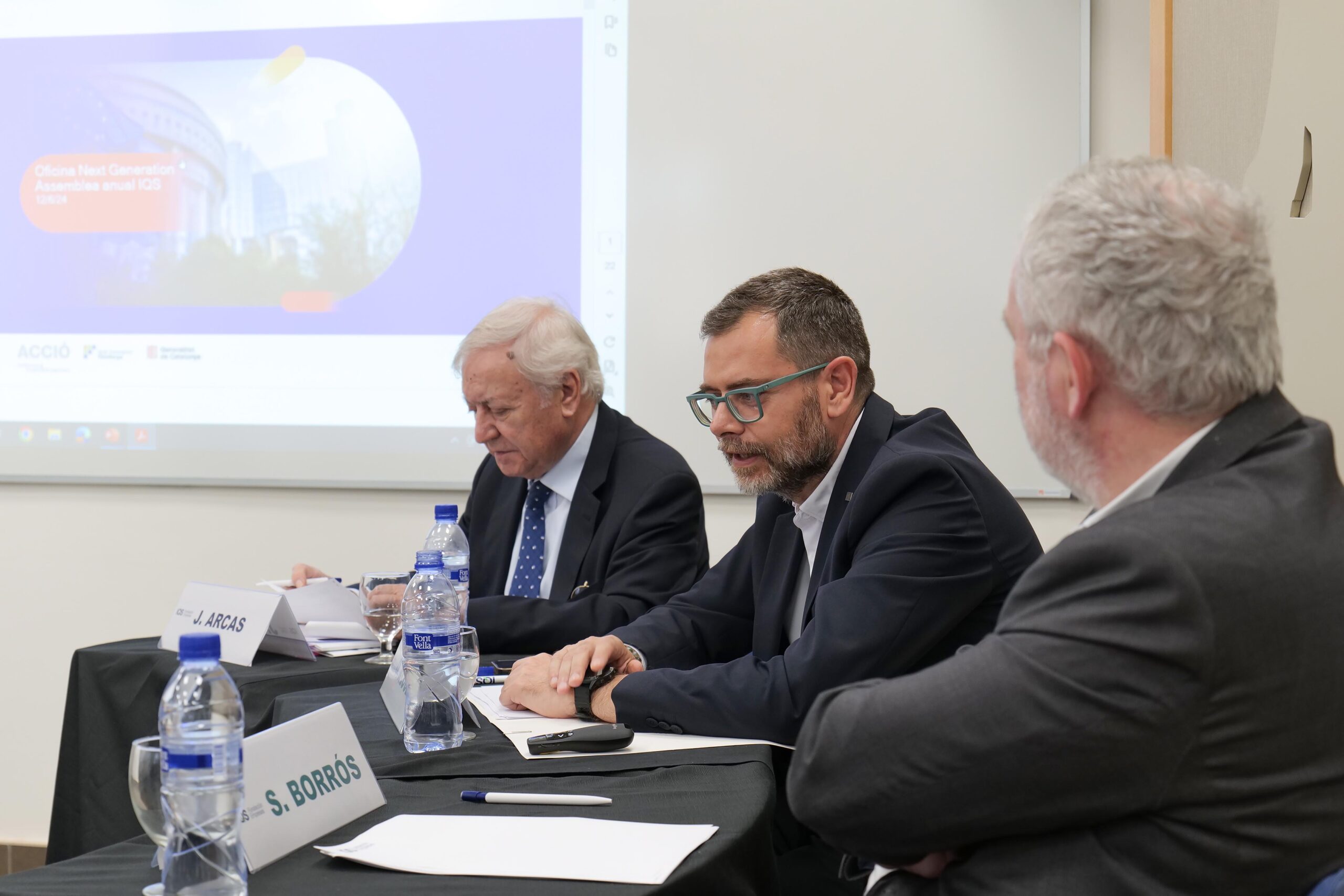On 12 June, the IQS Business Foundation held its Annual Meeting with the presence of collaborating companies and the Board of Trustees. The event was attended by Josep Arcas Romeu, President of the IQS Business Foundation, Salvador Borrós, Director of IQS, and Oriol Alcoba, Director General of Industry with the Government of Catalonia Department of Business and Labour, who gave the presentation “Next Generation Funds.”
Alcoba began his lecture by framing the Next Generation Funds within a global trend related to the resurgence of industrial policies in the West. “They emerged at a time when they were associated with the recovery from the pandemic. However, this is not the case. They are the result of a determined commitment from Europe, aware of its urgent need for transformation in industrial production,” said the Director General of Industry with the Government of Catalonia.
This trend, which brought to light once politically incorrect concepts such as “strategic autonomy,” “technological sovereignty,” and “industrial sovereignty” ended up triggering the approval of an industrial strategy in Europe in 2019, just before the pandemic. The big news broke in July 2020 and, as a result of negotiations between member states, Next Generation was launched: “800 billion euros, the equivalent of the entire budget of the European Commission. For the first time, Europe was in it together. And not only that, the plan required important reforms,” Alcoba stressed.
In July 2021, Brussels approved the Spanish Recovery, Transformation, and Resilience Plan with an investment of 70 billion euros, leaving the door open to another 70 billion if the objectives established by Europe were met. In the end, the second phase has resulted in an injection of 93 billion additional euros. More than expected in total: 160 billion euros. “The Spanish plan has four lines, two of which stand out: ecological transition and industrial transformation. 10 lever policies derive from these four lines, falling on 30 components (plus one, aimed at strengthening energy autonomy and a change to the model of its generation) that include 142 investments and 111 reforms,” summarized the Director General of Industry in a schematic manner. It entails infinite aid and subsidies and endless opportunities from which large companies and SMEs can benefit, although in many cases they are unaware of it due to the complexity involved in the plan.
From the beginning, these European funds have been managed by the central government. “The Government of Catalonia does not award aid, but it sought proactive action to maximize the return on money and present projects from Catalan companies,” he stated. In this sense, Alcoba explained that the Government of Catalonia has actively requested the Spanish Government to transfer the management of the European Next Generation aid plan funds to the autonomous communities. “At the moment, the refusal has been very clear,” he stressed.
For this reason, the Government of Catalonia launched a specific office aimed at advising “companies with operational headquarters in Catalonia and accompanying them in the complex process of identifying, understanding, and taking advantage of the multiple financing opportunities offered by PERTE and other instruments endowed with Next Generation EU funds.” Alcoba encouraged the companies present at the conference to explore the countless opportunities that these funds can offer not only to support their transformation and competitiveness, but also to open new business avenues.
Alcoba’s speech was the culmination of the IQS Business Foundation Annual Meeting, which began at 1:00 pm with an introduction by Josep Arcas, President of the IQS Business Foundation, and a speech by the Director of IQS, Salvador Borrós, who briefly described news and ongoing projects at the university.
Objectives met
The Director of IQS quickly reviewed some of the objectives achieved during academic year 2023-2024 within the strategic plan presented during last year’s meeting, a sustainable growth plan, with a special focus on five points: the teaching and pedagogical model as a distinguishing feature compared to other schools, reinforcing research, promoting technology transfer, and entrepreneurship, improving the experience of students and alumni as valuable and talented assets, personal development, and updating the pending digital transformation. Borrós highlighted that all of this has been done “without losing sight of the educational model inherited by IQS from the Society of Jesus, to which we want to give visibility.”
As Borrós made clear during his speech, the plan is on track as expected. In this sense, and with a focus on students, the renovation of the reception area and the adaptation of the ground floor have already been completed to bring all the services to students in a single location, including the creation of a single point of contact. The investment announced for the new NMR laboratory has also been made official. “The acquisition of two new cutting-edge devices, the innovative ICP-MS and the QTOF mass spectrometer, positions IQS as a leading laboratory in the field of metal analysis, chromatography, and mass spectrometry,” said the director of IQS, who also reported that the instruments are nearly installed and ready to start operating soon.
He also stated that among the short-term objectives is the completion of the Engineering teaching pilot plant, to which a -1 floor will finally be added, “which will be the industry 5.0 laboratory with communication below with the other laboratories,” and confirmed the launch of a co-creation laboratory.
The event concluded by welcoming the new companies that have joined the IQS Business Foundation over the past year: Cromology, DC Fine Chemicals, Grupo Italfarmaco, INKE, Meinsa, Quality Chemicals, Sandoz, and Takasago International, followed by inviting attendees to a meal at the IQS campus.










